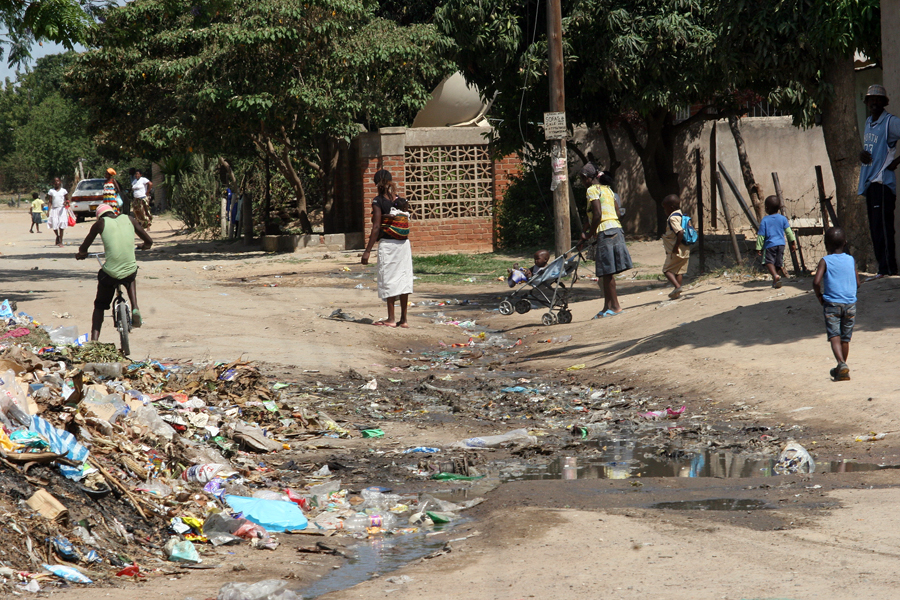
St Mary’s — one of the oldest and most populous suburbs in Chitungwiza — is a melting pot of poverty, malnutrition and vice.
By Moses Mugugunyeki
Residents of this forsaken settlement have to cope with age old dilapidated ancient houses in an area which appears to have long gone outside the local authorities’ radar as running water has become a thing of the past.
In fact, St Mary’s has over the years become synonymous with poverty, disease and crime.
Many families here live below the poverty datum line and are susceptible to infectious diseases such as TB, cholera, dysentery and Sexually Transmitted Infections (STIs).
“It’s a dog-eat-dog scenario in this suburb,” said Elliot Zulu, a resident from one of the crowded areas called Mangoromera. “Most residents here are out of employment and live in abject poverty.” The roads in the area are littered with potholes and rubbish. When it rains, they turn into streams of mud and sewage.
“Council is not helping either. The roads are poor, garbage is rarely collected and sewage flows have become the order of the day. It is hell living in this area,” Zulu said.
Zulu said his family of four shared a single room, with a few belongings piled in a corner. There is no tap water and they have to fetch the precious liquid from an unprotected well in the neighbourhood.
- Chamisa under fire over US$120K donation
- Mavhunga puts DeMbare into Chibuku quarterfinals
- Pension funds bet on Cabora Bassa oilfields
- Councils defy govt fire tender directive
Keep Reading
“This is the place I call home. I stay with my wife and two children. We don’t have tap water, so we fetch it from a well,” he said.
Behind Zulu’s lodgings lives another family of six which also occupies a single room. There were three children loitering outside the house. Instead of playing like other children, they were crying.
“Their parents wake up early in the morning to sell [cobra] floor polish and sweeping brooms. They are hardly at home in the morning,” Zulu said.
Finance and Economic Development minister Patrick Chinamasa said 64 000 people lost their jobs after 4 600 companies closed down between 2011 and October 2014.
At Chigovanyika and Huruyadzo — the main shopping centres in St Marys’— fish and meat are sold in the open even as uncollected rubbish litters the area and sewage flows everywhere.
“Meat and fish here are cheaper than in the butcheries and it’s affordable for most of us,” Zulu said.
Chitungwiza battles perennial water problems because it draws its water from Harare and must pay for the service.
“We have a major problem of water in Chitungwiza because we don’t have our own source,” said Chitungwiza mayor Phillip Mutoti. “However, the situation has improved lately because residents are receiving the commodity three days a week”.
Mutoti said council was battling with refuse collection because council’s fleet of garbage trucks is depleted.
“We do not have enough garbage trucks and it forces us to collect refuse once a week. Council is getting around $900 000 a month from ratepayers instead of $2,5 million. This makes it difficult on our part to improve the town’s water and sanitation,” said Mutoti. Harare-based sociologist, Yotamu Chirwa said disease outbreaks are aided by conditions of poverty.
“There is no doubt that diseases increase when poverty deepens. The diseases that are mostly related to poverty include Aids, malaria, TB, cholera and typhoid,” Chirwa said.
Meanwhile, prostitution is rising to alarming levels in the area. A large number of girls have joined the oldest profession to make ends meet.
“Most of these girls who are roaming around the shopping centre this time [11pm] are sex workers,” said Mike Dzvova, a vendor at Huruyadzo.
Dzvova sells various items including cigarettes, condoms and sweets outside a night spot. He said sex workers were his biggest customers.
“These girls, most of whom are so young and must be in school, buy cigarettes and condoms from me,” he said.
Driving along the streets of St Marys’ at night, one sees scores of women standing at street corners, soliciting for prostitution, most of them barely dressed.
“This is the only way that I can make money,” said Sheila, a prostitute who says she is 16 although she looks a lot younger. My parents are late and I joined prostitution for survival.”
She said she lives with a group of other sex workers in a single room in one part of the suburb which is known as Paradise. “It’s not a brothel. We stay as a group so that we share the rent and bills,” Sheila said.
A health official at a local clinic who spoke on condition of anonymity confirmed that the clinic was treating many people suffering from STIs and TB.
“STIs are prevalent in this area. The prevalence of TB is also very high considering that most families live under difficult conditions. TB thrives in squalid conditions,” she said.
Mutoti said the council was trying to decongest places like St Mary’s by encouraging people to buy residential stands.










